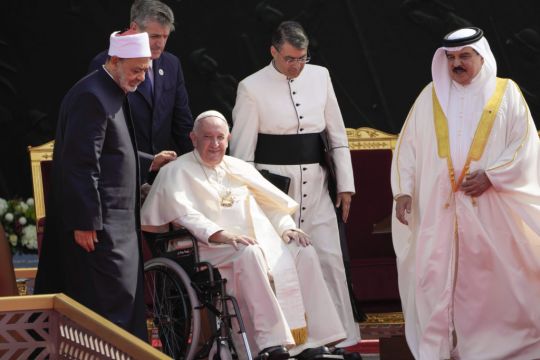Pope Francis has joined Muslim, Christian and Jewish leaders in calling for the world’s great religions to work together for peace, telling an interfaith summit that religion must never be used to justify violence and faith leaders must counter the “childlike” whims of the powerful to make war.
On his second day in the Gulf kingdom of Bahrain, Francis closed out a conference on East-West dialogue sponsored by King Hamad bin Isa Al Khalifa.
It was his second such conference in as many months, following one in Kazakhstan, evidence of Francis’s core belief that moments of encounter among people of different faiths can help heal today’s conflicts and promote a more just and sustainable world.
Sitting around him in the Sakhir royal palace grounds were leading Muslim imams, the spiritual leader of the world’s Orthodox Christians, and US rabbis who have long engaged in interfaith dialogue, as well as the king.

Speaker after speaker called for an end to Russia’s war in Ukraine and the start of peace negotiations.
The Russian Orthodox Church, which sent an envoy to the conference, has strongly supported the Kremlin in its war and justified it on religious grounds.
Francis told the gathering that, while the world seems to be heading apart like two opposing seas, the mere presence of religious leaders together was evidence that they “intend to set sail on the same waters, choosing the route of encounter rather than that of confrontation”.
“It is a striking paradox that, while the majority of the world’s population is united in facing the same difficulties, suffering from grave food, ecological and pandemic crises, as well as an increasingly scandalous global injustice, a few potentates are caught up in a resolute struggle for partisan interests,” he said.
“We appear to be witnessing a dramatic and childlike scenario: in the garden of humanity, instead of cultivating our surroundings, we are playing instead with fire, missiles and bombs, weapons that bring sorrow and death, covering our common home with ashes and hatred,” he said.
King Hamad, for his part, urged a coherent effort to stop Russia’s war in Ukraine and promote peace negotiations, “for the good of all of humanity”.
The visit is Francis’s second to a Gulf Arab country, following his 2019 landmark trip to Abu Dhabi, where he signed a document promoting Catholic-Muslim fraternity with a leading Sunni cleric, Sheikh Ahmed al-Tayeb.
Mr al-Tayeb is the grand imam of Al-Azhar, the seat of Sunni learning in Cairo, and has become Francis’s key partner in promoting greater Christian-Muslim understanding.

Mr al-Tayeb joined Francis in Bahrain and was on hand last month in Kazakhstan too.
In his prepared remarks, he called on Friday for an end to Russia’s war “to spare the lives of innocents who have no hand in this violent tragedy”.
Mr al-Tayeb also called for Sunni and Shiite Muslims to engage in a similar process of dialogue and try to heal their centuries of divisions, saying Al-Azhar was prepared to host such an encounter.
“Let us together chase away any talk of hate, provocation and excommunication and set aside ancient and modern conflict in all its forms and with all its negative offshoots,” he said.
Bahrain is ruled by a Sunni monarchy that has been accused by human rights groups of systematic discrimination against its Shiite majority, claims the government rejects.
Later on Friday, Mr al-Tayeb was to meet privately with Francis and participate in a larger encounter at the mosque in the royal palace with the Muslim Council of Elders, which he heads.
Francis was also bringing his message of dialogue to Bahrain’s Christian leaders by presiding over an ecumenical meeting and peace prayer at the Our Lady of Arabia Cathedral, the largest Catholic Church in the Gulf, which was inaugurated last year on land gifted to the church by King Hamad.

Francis opened his visit to Bahrain on Thursday by urging Bahrain authorities to renounce the death penalty and ensure basic human rights are guaranteed for all citizens – a nod to Bahraini Shiite dissidents who say they have been harassed and detained, subject to torture and “sham trials”, with some sentenced to death for their political activities.
The government denies discriminating against Shiites.
Francis also aimed to highlight Bahrain’s tradition of religious tolerance: unlike neighbouring Saudi Arabia, where Christians cannot openly practise their faith, Bahrain is home to several Christian communities as well as a small Jewish community.
In his prepared remarks to the forum, US rabbi Marc Schneier, who has long worked to promote Jewish-Muslim understanding and serves as King Hamad’s special adviser on interfaith matters, praised Bahrain as a “role model in the Arab world for co-existence and tolerance of different faith communities”.







